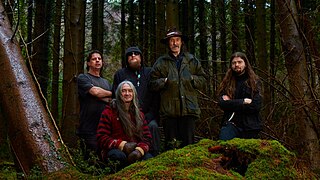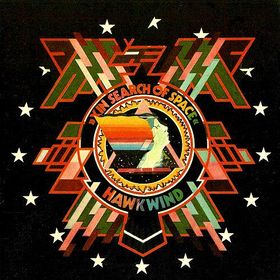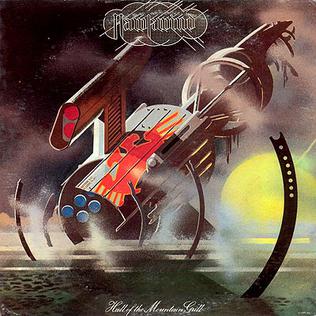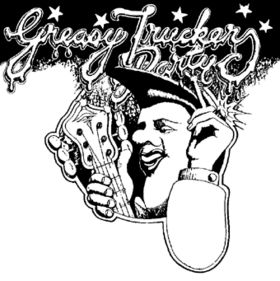
Hawkwind are an English rock band known as one of the earliest space rock groups. Since their formation in November 1969, Hawkwind have gone through many incarnations and have incorporated many different styles into their music, including hard rock, progressive rock and psychedelic rock. They are regarded as an influential proto-punk band. Their lyrics often cover themes of urban life and science fiction.

Space Ritual is a 1973 live double album recorded in 1972 by UK rock band Hawkwind. It is their fourth album since their debut, Hawkwind, in 1970. It reached number 9 in the UK Albums Chart and briefly dented the Billboard Hot 200, peaking at number 179.

Levitation is the tenth studio album by English rock group Hawkwind, released in 1980. It peaked at No. 21 on the UK Albums Chart.

In Search of Space is the second studio album from Hawkwind, released in 1971. It reached No. 18 on the UK Albums Chart.

Hall of the Mountain Grill is the fourth studio album by space rock band Hawkwind, released in 1974. It is regarded by many critics as a career highlight.

Warrior on the Edge of Time is the fifth studio album by the English rock band Hawkwind. Many of the lyrics are by Michael Moorcock, and the album is loosely based on the concept of Moorcock's novel The Eternal Champion. It was the band's highest-charting studio album on the UK Albums Chart, where it peaked at number 13, and was their third and last album to make the US Billboard chart, where it peaked at number 150. Reviews have been mixed, with Melody Maker panning the album and particularly criticizing the vocal work while the All Music Guide has praised the album for features such as the songwriting. This would also be the last album to feature the band's bassist Ian "Lemmy" Kilmister, who was fired from the band one day before the album's release.

Doremi Fasol Latido is a 1972 album by English space rock band Hawkwind. Recorded at Rockfield Studios and released on United Artists Records, it was their third album since their debut, Hawkwind, in 1970. It reached No. 14 on the UK album charts.

Sonic Attack is the eleventh studio album by the English space rock group Hawkwind, released on 2 October 1981. It spent five weeks on the UK Albums Chart peaking at #19.

The Chronicle of the Black Sword is the fourteenth studio album by the English space rock group Hawkwind, released in 1985. It spent two weeks on the UK Albums Chart peaking at #65. The album is based upon the adventures of Elric of Melniboné, a recurring character in the novels of science fiction author Michael Moorcock, a long-standing associate of the group, who contributes lyrics to one track on the album.

The Xenon Codex is the fifteenth studio album by the English space rock group Hawkwind, released in 1988. It spent two weeks on the UK albums chart peaking at #79.

Live Seventy Nine is a 1980 live album by Hawkwind recorded on their Winter 1979 UK tour. It reached #15 on the UK album chart.

Space Bandits is the sixteenth studio album by the English space rock group Hawkwind, released in 1990. It spent one week on the UK albums chart at #70.
"Hurry On Sundown" is a 1970 song by the UK rock group Hawkwind. It was the band's first record release, issued as a single in the UK on 26 June 1970, being an edit of the version that appeared two months later on the debut album Hawkwind. The song is inspired by Leroy Carr and Scrapper Blackwell's version of "Hurry Down Sunshine ", written by Mary Fix and Will Shade, originally recorded in 1934 and issued on the album Blues Before Sunrise.

Choose Your Masques is the thirteenth studio album by the English space rock group Hawkwind, released in 1982. It spent five weeks on the UK Albums Chart, peaking at No. 29.

Roadhawks is a 1976 compilation album by Hawkwind covering the years 1970-1975, and it peaked at #45 on the UK album charts. It is the first compilation release from the group, marking the end of the group's tenure with United Artists Records. The music was compiled and mixed by the group's Dave Brock.

This is Hawkwind, Do Not Panic is a 1984 live album by the English space rock group Hawkwind. The album consisted of two discs: an LP which was recorded during the group's 1980 Levitation tour; and a 12" EP recorded at their June 1984 appearance at the Stonehenge Free Festival.

Out and Intake is a 1987 live/studio album by the English space rock group Hawkwind.

"Silver Machine" is a 1972 song by the UK rock group Hawkwind. It was originally released as a single on 9 June 1972, reaching number three on the UK singles chart. The single was re-issued in 1976, again in 1978 reaching number 34 on the UK singles charts, and once again in 1983 reaching number 67 on the UK singles charts. The original mix has been re-released on the remasters version of In Search of Space.

Greasy Truckers Party is a 1972 live album by various artists recorded at a February 1972 Greasy Truckers concert at the Roundhouse in London. The concert featured three bands, Man, Brinsley Schwarz, and Hawkwind, and musician Magic Michael. Originally a double vinyl album, in a limited edition of 20,000 and sold at just £1.50, it rapidly sold out, and became a collector's item.
In the world of British underground rock, the Greasy Truckers Party ... ... looms about as large as the Monterey International Pop Festival does in American rock lore; it wasn't the biggest gig ever played by the bands involved, but for reasons of exposure, and resulting word-of-mouth, and the excerpted live album that followed, it came to define what they were capable of.


















